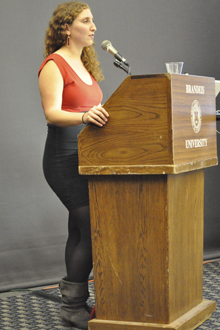'Girldrive' author says her cross-country trip shaped her view of feminism
Nona Willis Aronowitz shares stories of encounters with women across America
 Photos/David J. Weinstein
Photos/David J. WeinsteinNona Willis Aronowitz speaks at Brandeis on Nov. 16
In 2007, journalist and cultural critic Nona Willis Aronowitz and photographer Emma Bee Bernstein, both then 22 years old, hit the road for a trip across the United States to discover how their generation of young women related to feminism and ideas about gender justice. They called it “Girldrive” – and the project grew to include a blog, and a book, "Girldrive: Criss-Crossing America, Redefining Feminism," published by SealPress last year.
Willis Aronowitz, who has written on women, sex, music, technology, film and youth culture for a variety of publications, told a packed crowd in International Lounge at Brandeis Nov. 16 that she encountered many feminists on the trip, but also met women who might not have known the meaning of the word or considered themselves “feminist” and who nevertheless were “doing kick-ass things” and “living the legacy of feminism.” Her book is a combination of diary entries and profiles of women met along the way.
Willis Aronowitz shared anecdotes with her Brandeis audience about conversations that cause her to rethink the meaning of feminism. One story concerned a 16-year-old Latina from Chicago who had never heard the word “feminist,” but who, after learning about it, said she would definitely describe herself that way; another was with a woman in Texas who was training to be a midwife. Although the woman was opposed to abortion and pre-marital sex and did not share her own politics, Willis Aronowitz found her to be strong, independent, and thoughtful.
Along the way, said Willis Aronowitz, “Girldrive made me less dogmatic than I used to be” through sitting down with these and other women and hearing their stories and perspectives.
Some in the audience suggested there should be alternate terminology to the word "feminist" without the baggage that word has for many, but Willis Aronowitz declined to suggest or advocate for an alternatives or even to worry about the use of the term “feminist” at all.
“As long as you have a greater consciousness, are aware of these issues, are talking about these issues [of gender and women’s roles], that is good enough,” she remarked, “whether or not you see yourself as a ‘feminist.’”
“Girldrive is a great illustration of how far-reaching feminism has become and how overarching and inclusive it can be,” said Danielle Carrus after the event. Dana E. Bialer, an MPP/MA candidate in Social Policy and Women and Gender Studies at the Heller School, agreed, commenting that “the Girldrive project is a widely accessible, great initial step in acknowledging the diversity of what feminism looks like today.”
The talk "was an inspiring event for a young feminist like myself," said Julianne Smith, who is studying for a joint master's in Women's and Gender Studies and Sociology. "She articulately expressed how important it is for young women to embrace feminism and to learn what it means. Her book and project made me realize how important it is to talk about feminism with my peers, and to keep the spirit alive."
“I was very pleased that we had the voice of a younger person talking about contemporary social issues in a way that inspired our own students – as many of them told me!” said Joyce Antler, chair of the American Studies Program, Samuel Lane Professor of American Jewish History and Culture, and a founder of the Women's and Gender Studies program.
The event was a follow-up of sorts to the March 2010 Tillie K. Lubin Symposium at Brandeis featuring author Susan Faludi, who spoke on “The Mother-Daughter Power Failure.”
Willis Aronowitz’s visit was hosted by the Women's and Gender Studies Program and cosponsored by a variety of programs, departments and centers, including American Studies, Anthropology, Education, Sociology, the International Center for Ethics, Justice, and Public Life, and the Tillie K. Lubin Fund.
Categories: Humanities and Social Sciences, Student Life





